April 27, 2024
Thesaurus : Doctrine
► Référence complète : A. Rouyère, “Approche sectorielle de quelques visages de l’entreprise en droit administratif”, L’entreprise compliante : une délégation de la puissance publique ?", RFDA 2024, p. 29.
____
🦉Cet article est accessible en texte intégral pour les personnes inscrites aux enseignements de la professeure Marie-Anne Frison-Roche
________

Jan. 12, 2024
Organization of scientific events
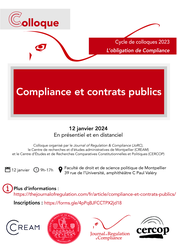
🌐follow Marie-Anne Frison-Roche on LinkedIn
🌐subscribe to the Newsletter MAFR Regulation, Compliance, Law
____
► Full Reference: M.-A. Frison-Roche, C. Gilles and A. Oumedjkane (dir.), Compliance et contrats publics (Compliance and public contracts), Journal of Regulation & Compliance (JoRC), Centre de recherches et d’études administratives de Montpellier (CREAM) and Centre d’Études et de Recherches Comparatives Constitutionnelles et Politiques (CERCOP) of the Montpellier University, Faculté de droit et de science politique de Montpellier, January 12, 2024
____
🌐consult a general presentation of this event on LinkedIn, linking to a presentation of each speech (in French)
____
🏗️This symposium takes place in the cycle of symposiums organised by the Journal of Regulation & Compliance (JoRC) and its partners Universities, focusing in 2023-2024 on the general theme of the Compliance Obligation
____
📚The works will then be inserted in the books:
📕Compliance et contrat, to be published in the 📚Régulations & Compliance Serie, co-published by the Journal of Regulation & Compliance (JoRC) and Dalloz, published in French.
📘Compliance & Contract, to be published on the 📚Compliance & Regulation Serie, co-published by the Journal of Regulation & Compliance (JoRC) and Dalloz, published in English.
____
► General presentation of the symposium: Compliance is developing throughout the legal system, through both Public and Private Law techniques. Public Contract Law bears witness to this in two ways: through its scope, in that Compliance applies to economic relationships entered into by public bodies, and through its object, which internalises a reconciliation between their economic interests and a set of other general interest objectives, or "Monumental Goals", a reconciliation for which public bodies have traditionally been responsible. In addition to unilateral acts, contracts have their rightful place as a practical means of achieving this reconciliation. Its flexibility allows for negotiation and adjustment of the burdens to be placed on the co-contracting parties.
The aim of this symposium is to link the different manifestations of the Compliance Obligation in public contracts and thus give coherence to policies which are still too often considered in a watertight manner because they relate to very different aims and areas.
Firstly, at the procurement stage, the promotion of responsible or innovative procurement, particularly from an environmental point of view, is one of the signs of Compliance's presence. On a completely different note, the same is true of the CJEU's challenge to the automatic application of bans on tendering, which prevent contracting authorities from ruling on a candidate's reliability by taking into account the compliance programmes implemented by companies since their conviction.
Secondly, at the litigation stage, the Conseil d'État's (French Council of State) recent broad recognition of the illegality of an administrative contract on the grounds of a breach of ethical obligations has tempered the drive to make contracts more secure, drawing the consequences of the major drive for transparency in public life that has been underway since 2013.
The aim of the morning session will be to understand the various forms of the Compliance Obligation in public contracts. This overview will make it possible, in the afternoon, to aim to unify the Compliance Obligation in public contracts.
____
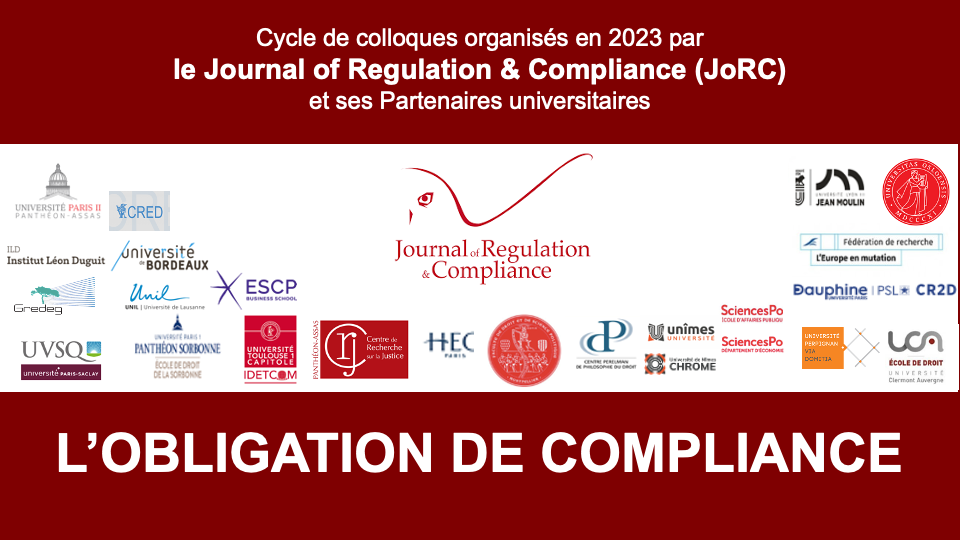
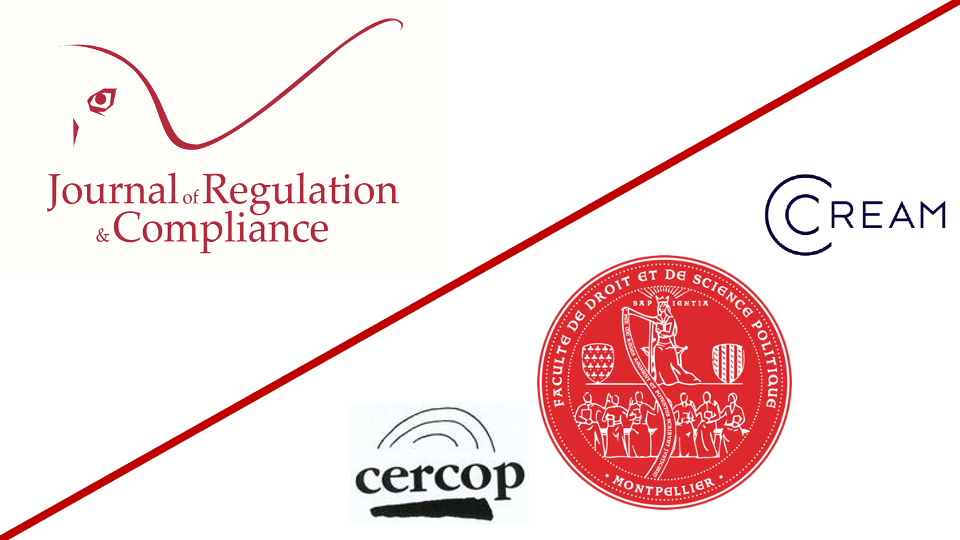
____
► Speakers:
🎤Ugo Assouad, PhD student at the Montpellier University, CREAM
🎤Philippe Augé, President of the Montpellier University
🎤Clémence Ballay-Petizon, PhD student at the Montpellier University, CREAM
🎤Yannisse Benrahou, PhD student at Paris-Nanterre University, CRDP
🎤Léon Boijout, PhD student at the Montpellier University, CREAM
🎤Julien Bonnet, Full Professor at the Montpellier University, CERCOP
🎤Guylain Clamour, Dean of the Montpellier Faculty of Law and Political Science
🎤Marie-Anne Frison-Roche, Professor of Regulatory and Compliance Law, Director of the Journal of Regulation & Compliance (JoRC)
🎤Pierre-Yves Gadhoun, Professor at the Montpellier University, CERCOP
🎤Pascale Idoux, Professor at the at the Montpellier University, CREAM
🎤Nedjma Kontoukas, PhD student at the Montpellier University, CREAM
🎤Valentin Lamy, Senior Lecturer at the Lorraine University, IRENEE
🎤Antoine Oumedjkane, Senior Lecturer at Lille University, ERDP
🎤Lucien Rapp, Emeritus Professor at Toulouse Capitole University
🎤Marion Ubaud-Bergeron, Full Professor at the Montpellier University, CREAM
____
🧮Read a detailed presentation of the event below⤵️
Jan. 12, 2024
Conferences

🌐follow Marie-Anne Frison-Roche on LinkedIn
🌐subscribe to the Newsletter MAFR Regulation, Compliance, Law
____
► Full Reference : M.-A. Frison-Roche, "Conclusion. Compliance et contrats publics : une alliance naturelle" ("Conclusion. Compliance and Public Contracts: a natural alliance"), in M.-A. Frison-Roche, C. Gilles & A. Oumedjkane (dir.), Compliance et contrats publics (Compliance and public contracts), Journal of Regulation & Compliance (JoRC), Centre de recherches et d’études administratives de Montpellier (CREAM) and Centre d’Études et de Recherches Comparatives Constitutionnelles et Politiques (CERCOP) of the Montpellier University, Faculté de droit et de science politique de Montpellier, 39 rue de l’Université, Amphiteatre C Paul Valéry, January 12, 2024
____
🧮see the full programme of this event
____
✏️read the notes taken on the spot to draw up the symposium conclusion
____
🌐consult on LinkedIn a general presentation of this event, which links to a presentation of each speech (in French)
____
🧱consult the co-organisation sheet of this event, giving an account of the various speakers
____
► English Summary of the conference: Firstly, it would appear that, as with all the contracts studied in the area of Compliance, public contracts are, for the public authorities or public companies, an instrument through which they implement the Compliance Obligation imposed on them by the laws and regulations. Public bodies involved in public contracts are particularly concerned because of the points of contact, even intimacy, between Compliance Law and the general interest. But the contract, whether public or private, remains in its classic conception what results from the expression of two wills which exchange their consents📎
Secondly, in terms of free will, public contracts can be the means by which public bodies and their co-contractors express their conception of what needs to be done to preserve the future, for example in environmental and social matters. On the contrary, the seemingly technical issue of exclusions from public contracts, whether they be automatic exclusions or optional exclusions, expresses the extent to which economically powerful players (public authorities, municipalities, public companies) take care of each other. In this respect, Compliance Law runs counter to Competition Law📎
But thirdly, the public contract, in that it expresses the general interest by its very nature, its ex ante nature reinforces regulatory action and the nature of Compliance as an extension of Regulation📎
Moreover, fourthly, the public contract appears to be the model for the Compliance Contract. The public contract is a model first of all because of the central place of the general interest. The "Monumental Goals" in which the substantive definition of Compliance Law is anchored📎
The public contract is also a model because the contract is handled by a powerful party, in this case the public entity. The subject of Compliance Law is the powerful company, and only that company, chosen because it is powerful and because it uses that power to achieve the Monumental Goals. In this respect, the "exorbitant powers" that characterise the public contractor are reconstituted either by Compliance laws or by stipulations, which confer on all obliged or voluntary companies - by virtue of CSR, which has many points of contact with Compliance Law as long as it is not confused with obeying the applicable regulations (which is what "conformity" is)📎
The judge is the one who, through contractual litigation, both public and private, will bring to life these Monumental Goals desired by the State, carried by powerful entities (administration, companies), pledge of the Rule of Law📎
These include contractual mechanisms for information, audit, disclosure, control, collaboration, supervision, etc., through which the company, whether private or public, takes charge of the structure it has created, for example the value chain it masters📎
It can therefore be concluded that this logic of a public contract as an instrument of administrative action to achieve goals of general interest, now fully taken up in Compliance Law, must be acculturated into the Ordinary Contract Law and must be preserved in Public Contract Law, which presupposes a new balance with Competition Law, which for a long time carried within Public Law a contract model without concern for sustainability or the collective interest. To achieve this, dialogue between judges is essential. The Conseil d'État (French Council of State) and the Cour de cassation (French Court of cassation) set the example📎
____
📝This conference will be followed by an article, "The public contract, model of the Compliance Contract", which will be published in the book 📘Compliance and contract.
________
🕴️M.-A. Frison-Roche, 🚧Competition Law and Compliance Law, 2018.
🕴️M.-A. Frison-Roche (ed.), 📕Régulation, Supervision, Compliance (Regulation, Supervision, Compliance), 2017.
🕴️M.-A. Frison-Roche, 📝Compliance Monumental Goals, beating heart of Compliance Law, in 🕴️M.-A. Frison-Roche (ed.), 📘Compliance Monumental Goals, 2022.
🕴️M.-A. Frison-Roche, 📝Reinforce the Judge and the Lawyer to impose Compliance Law as a characteristic of the Rule of Law, in 🕴️M.-A. Frison-Roche (ed.), 📘Compliance Jurisdictionalisation, 2023.
🕴️M.-A. Frison-Roche, 📝Reinforce the Judge and the Lawyer to impose Compliance Law as a characteristic of the Rule of Law, in 🕴️M.-A. Frison-Roche (ed.), 📘Compliance Jurisdictionalisation, 2023.
🕴️M.-A. Frison-Roche, 📝Assessment of whistleblowing and the obligation of vigilance regarding International Competitiveness, in 🕴️M.-A. Frison-Roche (ed.), 📘Compliance Monumental Goals, 2022.
Conseil d'État (French Council of State) and Cour de cassation (French Court of cassation), 📗Du droit de la régulation au droit de la compliance : quel rôle pour le juge ?, La Documentation Française, 2024 (to be published).
Feb. 2, 2023
Thesaurus : Doctrine

► Full Reference: F. Raynaud, "Le juge administratif et la compliance" ("The Administrative Judge and the Compliance Law"), in M.-A. Frison-Roche (ed.), La juridictionnalisation de la Compliance, coll. "Régulations & Compliance", Journal of Regulation & Compliance (JoRC) and Dalloz, 2023, p. 473-478.
____
📕read a general presentation of the book, La juridictionnalisation de la Compliance, in which this article is published
____
► Summary of the article (done par the Journal of Regulation & Compliance): The author studies the close relationship between Compliance Law and Soft Law, such as the Administrative Judge has made room for it in his case law. This was particularly the case with the judgments of the Conseil d'État (French Council of State) in 2016, relating to legal topic of Regulatory Law, which is extended by Compliance Law.
This concern to internalize in companies what the public authorities want had also been taken into consideration by the Conseil d'État by small touches from 2010 and has continually expanded. This is particularly the case when the document issued is "de nature à produire des effets notables, notamment de nature économique, ou ont pour objet d'influer de manière significative sur les comportements des personnes auxquelles ils s'adressent" ("likely to produce significant effects, in particular of an economic nature, or are intended to significantly influence the behavior of the people to whom they are addressed"), which is related to compliance issues directly. This new concept adopted by the Conseil d'État has led it to review and control numerous "positions", "recommendations", "guidelines", etc., adopted by multiple authorities, to protect the persons on whom these acts have a "notable effect", the Conseil sometimes not hesitating to censor the issuing body. In Banking compliance, the Soft Law, more specifically issued by the European Banking Authority, gave the Administrative Judge the opportunity to adjust his control with that exercised by the Court of Justice seized by a preliminary question.
Thus, "Par sa jurisprudence sur la justiciabilité des actes de droit de souple, le Conseil d’Etat s’affirme donc comme un acteur de la compliance en permettant aux entités visées par ces actes et soumises à leur égard à une obligation de compliance de saisir le juge administratif d’un recours en annulation contre ces actes, afin qu’ils puissent être soumis à un contrôle de légalité et, le cas échéant, annulés" ("Through its case law on the justiciability of Soft Law acts, the Conseil d'État therefore asserts itself as a compliance actor by allowing the entities covered by these acts and subject to a compliance obligation in their regard to seize the administrative judge of an action for annulment against these acts, so that these acts can be subjected to a control of legality and, if necessary, annulled").
But must the administrative judge be seized. It can be the case in new fields, for example in climate matters, as he we in the Grande Synthe case. By its decision, "Le Conseil d’Etat va ainsi au bout de la logique du dispositif mis en place par le législateur et par le pouvoir réglementaire pour mettre en œuvre les accords de Paris, lesquels reposent sur une forme de compliance à l’échelle mondiale, chaque Etat signataire s’engageant, en quelque sorte, à faire le nécessaire pour atteindre un objectif commun à une date donnée, à charge pour chacun de s’organiser pour l’atteindre. En l’absence d’un juge international capable de vérifier le respect de ces engagements, le juge national apparait le plus naturel pour accepter de vérifier, lorsqu’il est saisi d’un litige en ce sens, que ces engagements ne restent pas lettre morte. " ("The Conseil d'État thus goes to the end of the logic of the system put in place by the legislator and by the administrative power to implement the Paris Agreements, which are based on a form of compliance at the worldwide scale, each signatory State undertaking, in a way, to do what is necessary to achieve a common goal by a given date, it being up to each to organize itself to achieve it. to verify compliance with these commitments, the national judge seems the most natural to accept to verify, when seized of a dispute in this sense, that these commitments do not remain a dead letter".).
Through this general movement, "La compliance est devenue un nouveau mode de régulation d’un nombre croissant d’activités. " ("Compliance has become a new way of regulating a growing number of activities.").
________

Dec. 5, 2022
Teachings : Participation à des jurys de thèses

♾️ suivre Marie-Anne Frison-Roche sur LinkedIn
♾️s'abonner à la Newsletter MAFR Regulation, Compliance, Law
____
► Référence complète : M.-A. Frison-Roche, membre du jury de la thèse d'Antoine Oumedjkane, Compliance et droit administratif, Université de Montpellier, Salle des Actes, Université de Montpellier, 5 décembre 2022, 14h-
____
🪑🪑🪑Autres membres du jury :
🕴🏻Pascale Idoux, directrice de la thèse
🕴🏻Lucie Cluzel-Métayer, rapporteure
🕴🏻Aude Rouyère, rapporteure
🕴🏻Thomas Perroud, professeur à l'Université Panthéon-Assas (Paris II)
____
► La thèse a été ultérieurement publié : cliquer ICI
____
Jan. 31, 2022
Thesaurus : Doctrine
► Référence complète : Hoynck, S., Le juge administratif et le dérèglement climatique. Libres propos, AJDA, 2022, p.147 et s.
____
► Résumé de l'article par l'auteur : C'est essentiellement depuis la signature de l'accord de Paris que les juges - pas seulement en France - ont été invités par diverses requêtes à prendre leur part dans la lutte contre le dérèglement climatique. Le risque de tels contentieux est qu'ils n'aient qu'une dimension incantatoire, qu'ils ne permettent que de décerner des bons ou des mauvais points à la politique climatique d'un gouvernement, ce qui n'est pas la conception que le juge administratif français se fait de son office. Si de tels contentieux ne sauraient à l'évidence constituer la solution unique à la crise climatique, le juge a bien son rôle à jouer.
March 23, 2018
Thesaurus : Doctrine
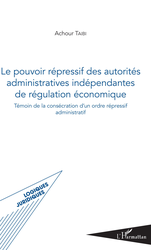
Référence complète : Taibi, A., Le pouvoir répressif des autorités administratives indépendantes de régulation économique. Témoin de la consécration d'un ordre répressif administratif, coll. "Logiques juridiques", L'Harmattan, 2018, 664 p.
L'avènement des autorités administratives indépendantes de régulation économique a grandement contribué à la consécration d'un ordre répressif administratif aux côtés de l'ordre pénal, de même qu'il a contribué au renouvellement de la notion de sanction administrative. Leur pouvoir répressif interpelle à plus d'un titre car il illustre parfaitement l'exorbitance du droit administratif et des pouvoirs de l'administration en matière économique.
L'atout de cet ouvrage est de traiter non seulement du pouvoir répressif des autorités administratives indépendantes en matière de régulation économique, mais également des autres problématiques soulevées par cette nouvelle notion juridique ( indépendance, rapprochement avec le système de l'administration-juge ...).
Lire la quatrième de couverture.
July 28, 2016
Thesaurus : 03. Conseil d'Etat
Lire l'Ordonnance rendue par le Conseil d’État.
La personne avait saisi les juges administratifs car il est l'objet dans sa détention d'une télésurveillance en continue.
Sa détention provisoire est organisée dans le cadre d'une procédure sur des faits d'homicides multiples s'étant déroulés dans le lieu de spectacle "Le Bataclan".
La personne conteste le traitement dont il est l'objet, notamment parce que le caractère continu de cette télésurveillance constituerait une atteinte à sa vie privée, dont la protection est protégée par un droit de l'homme dont il est titulaire au terme de l'article 8 de la Convention européenne des droits de l'Homme.
Le 15 juillet 2016, le juge administratif des référés rejette sa demande.
Sur recours, le Conseil d’État par une ordonnance rendue par trois juges des référés rejette le recours.
____
Le Conseil d’État rappelle la charge de preuve qui pèse sur celui qui veut obtenir la suppression du dispositif en alléguant son droit subjectif : le requérant doit démontrer que "la mesure dont il fait l’objet serait manifestement incompatible avec les stipulations de l’article 8 de la convention européenne de sauvegarde des droits de l'homme et des libertés fondamentales", ce qui la rendrait de ce fait manifestement illégale et devrait alors être rapportée.
L'Ordonnance est longuement motivée, pour justifier ce qui est désigné par le Conseil d’État comme "la compatibilité de l’atteinte portée au droit de M. B...au respect de sa vie privée avec l’article 8 de la convention européenne de sauvegarde des droits de l'homme et des libertés fondamentales".
Le Conseil d'Etat rappelle que "il résulte de l’instruction que tant le caractère exceptionnel des faits pour lesquels M. B... est poursuivi, qui ont porté à l’ordre public un trouble d’une particulière gravité, que le contexte actuel de poursuite de ces actes de violence terroriste, font, à la date de la présente décision, obligation à l’administration pénitentiaire de prévenir, avec un niveau de garantie aussi élevé que possible, toute tentative d’évasion ou de suicide de l’intéressé".
Il poursuivit la première partie de son raisonnement : "eu égard à la forte présomption selon laquelle ce dernier peut bénéficier du soutien d’une organisation terroriste internationale disposant de moyens importants, et alors même qu’il n’aurait pas manifesté à ce jour de tendance suicidaire, sa surveillance très étroite, allant au-delà de son seul placement à l’isolement, revêt ainsi, à la date de la présente décision, un caractère nécessaire".
Puis le Conseil d’État passe à la seconde question et souligne que : "il résulte également de l’instruction que l’administration, qui devra statuer sur le maintien de la mesure de vidéosurveillance continue au plus tard à l’échéance de la durée de trois mois prévue par la décision du 17 juin 2016, est également en mesure de s’assurer régulièrement de son bien fondé, notamment, ainsi qu’il a été rappelé à l’audience, par l’existence d’une surveillance médicale régulière ; que compte tenu de cette circonstance, ainsi que des modalités de mise en œuvre de la vidéosurveillance, qui comportent notamment la mise en place de dispositifs permettant de respecter l’intimité de la personne, l’absence de transmission ou d’enregistrement sonore, l’usage, ainsi qu’il a été précisé à l’audience, de caméras à infrarouge pendant la nuit, l’absence de dispositif biométrique couplé, la limitation de la durée de conservation des images et l’encadrement de leurs droits d’accès, la mesure contestée ne porte pas au droit au respect de la vie privée du requérant une atteinte manifestement disproportionnée aux buts en vue desquels elle a été établie".
Aug. 31, 2014
Blog
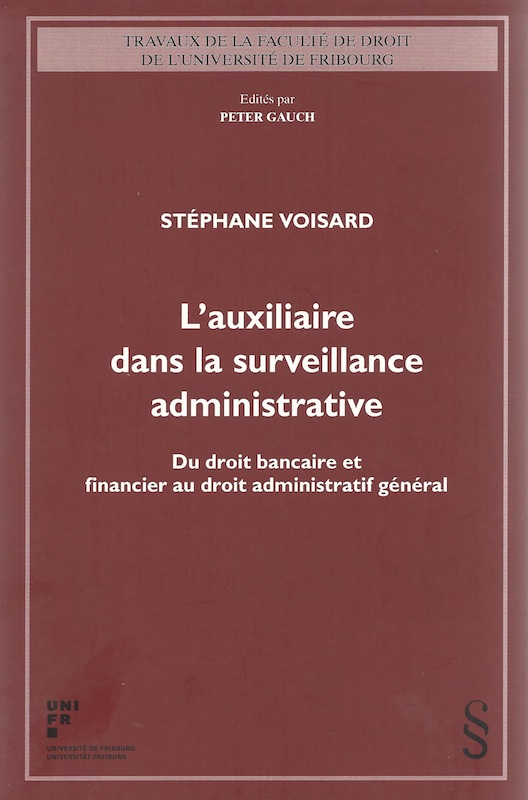 L'ouvrage de Stéphane Voisard est très intéressant car il montre que des personnes privées sont intégrées par la puissance publique pour que le système de supervision des banques soit efficace. Il faut mais il suffit que ces personnes soient des experts fiables et crédibles.
L'ouvrage de Stéphane Voisard est très intéressant car il montre que des personnes privées sont intégrées par la puissance publique pour que le système de supervision des banques soit efficace. Il faut mais il suffit que ces personnes soient des experts fiables et crédibles.
Il montre tout à la fois que c'est une conception assez générale du droit administratif.
Son ouvrage démontre que cet état du droit et de sa pratique dépasse la distinction du droit public et du droit privé.
Updated: July 31, 2013 (Initial publication: Sept. 20, 2011)
Teachings : Les Grandes Questions du Droit, semestre d'automne 2011

Jan. 13, 2009
Thesaurus : Doctrine
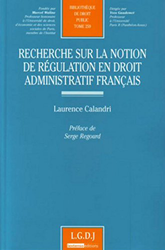
Référence générale: Calandri, L., Recherche sur la notion de régulation en droit administratif français, préface de S. Regarourd, coll. "Bibliothèque de droit public", t. 259, L.G.D.J, 2009, 734 p.
Lire la quatrième de couverture.
Cet ouvrage a été publié à la suite d'une thèse soutenue par l'auteur en 2003.

Nov. 10, 2005
Teachings : Participation à des jurys de thèses
Référence : Frison-Roche, M.-A., Rapporteure et membre du jury de la thèse de Laurence Calandri, Toulouse I ( dir. Serge Regourd), Recherche sur la notion de régulation en droit administratif français.
Autres membres du jury : Jacques Chevallier, Françoise Fraysse, Martine Lombard, Lucien Rapp, Serge Regourd
Soutenance le 10 novembre 2005
La thèse a été publiée 2009 chez LGDJ.